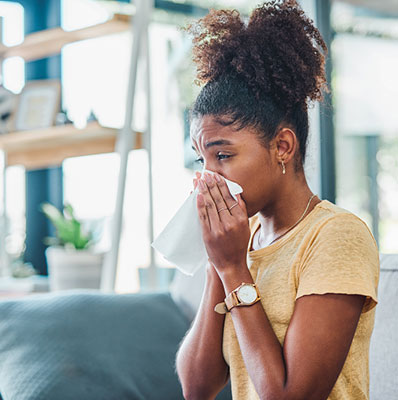How to Prepare for Your Childs Allergy Testing

August 31, 2023
Allergies are no fun for anyone, but seeing your child suffering from them is even worse. Rather than trying to figure it out on your own through a long process of elimination, which might fail to pin down the culprit anyhow, the best course of action is to see an allergist and arrange for a comprehensive allergy test.
What are the tests like? How should a parent prepare a child for the test? We raised these questions with Juan Ravell, M.D., division chief of allergy and immunology at Joseph M. Sanzari Children’s Hospital at Hackensack University Medical Center.
What to Expect From Allergy Testing
The three most common allergy tests:
- Skin prick test. Also called a scratch test, this test involves placing a small amount of allergens on the skin, often on the forearm or back, and pricking the skin to allow the allergen to go under the skin’s surface. The skin is then observed for local swelling and redness (allergic reactions). Skin prick tests are used for the evaluation of food, environmental and some drug allergies.
- Intradermal testing. This type of test is usually performed if a skin prick test comes up negative but the doctor believes there may still be a chance of an allergy. A small needle is used to place the test allergen a little deeper into the skin than the scratch test would allow for. This test is done for environmental and drug allergies. Positive and negative controls are used to make sure the results are reliable.
- Food challenges. This is a feeding test done under close medical supervision. During an oral food challenge, the child is gradually fed increasing amounts of the food he or she may be allergic to, under closed medical observation to assess whether the food can be tolerated. Food challenges are generally performed to determine if an allergy or adverse reaction is related to a specific food or if it is suspected that a child may have outgrown a previous food allergy.
Skin tests are most often the first step in allergy testing for children, as they are the quickest and most non-invasive. “When you see a child, you're usually more conservative and try to avoid unnecessary tests or injections,” Dr. Ravell says.
While the test itself is not painful, it is possible to see some discomfort such as redness or itching if an allergy is present. Generally, results take about 15–20 minutes, and any residual discomfort will pass shortly after.
Dr. Ravell recommends parents do some research to familiarize themselves with the tests and what the results may look like. It also is necessary to inform doctors of any medication your child might be taking, in case it may affect the test. Parents should check with their allergist’s office, as some allergy medications have to be stopped a week before allergy testing.
How to Prepare Your Child for Allergy Testing
To better prepare your child for their upcoming allergy testing, Dr. Ravell recommends these steps:
- First, talk to the doctor ahead of time to understand which tests are likely to be performed.
- Next, have an honest discussion with your child about what to expect, whether it may be uncomfortable and how long it will last.
- Make sure your child understands why they need to see a doctor for testing and that it will help them feel better.
- During testing, especially for young children, bring a distracting toy, book or electronic device to take away some of the discomfort.
“It's important to let your child know that by seeing the doctor, they might be able to find out what it is that's causing them to feel sick, and to identify those triggers so that they can learn how to avoid them,” Dr. Ravell says. “The main thing is to be honest with your child. Let them know what to expect.”
Next Steps & Resources:
- Meet our source: Juan Ravell, M.D.
- To make an appointment with an allergist near you, call 800-822-8905 or visit our website.
- Learn more about Pediatric Allergy & Immunology
The material provided through HealthU is intended to be used as general information only and should not replace the advice of your physician. Always consult your physician for individual care.






